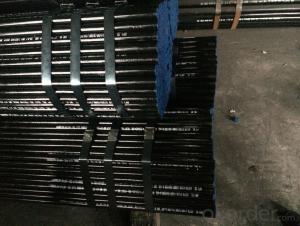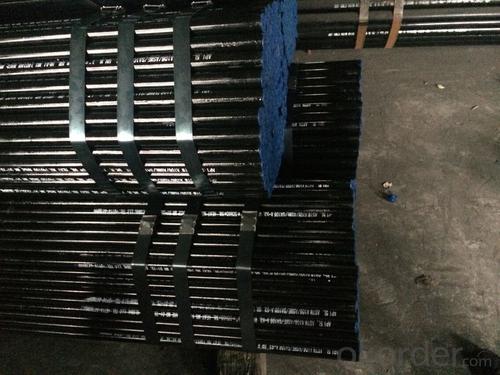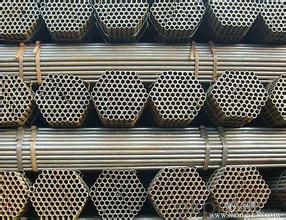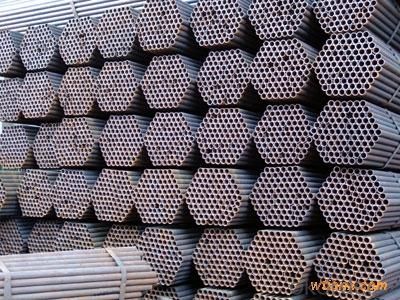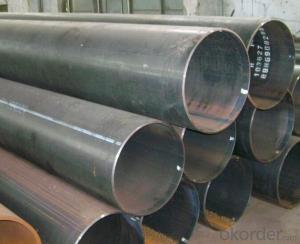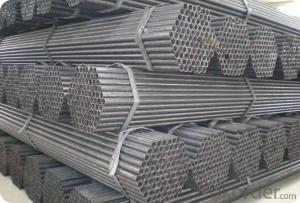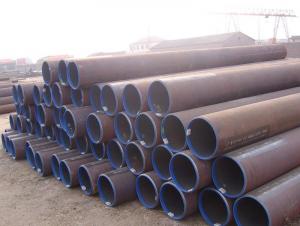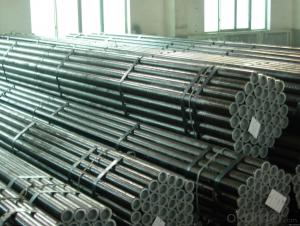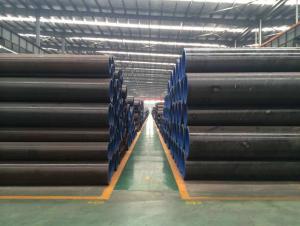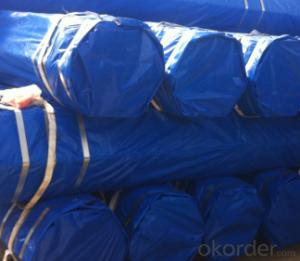Welded Black ERW Steel Pipe API 5L ASTM A53 Steel Pipe for Water Oil Conveying
- Loading Port:
- China Main Port
- Payment Terms:
- TT or LC
- Min Order Qty:
- 25 m.t.
- Supply Capability:
- 5500 m.t./month
OKorder Service Pledge
OKorder Financial Service
You Might Also Like
1、Structure of Welded Black ERW Steel Pipe API 5L ASTM A53 :
Welded Black ERW Steel Pipe API 5L ASTM A53 is electric resistance welding, the abbreviation for ERW for transporting oil and natural gas vapor liquid objects, can meet the requirements of high and low pressure, the transport in the world with pipe sector accounted for a pivotal position.
2、Main Features of Welded Black ERW Steel Pipe API 5L ASTM A53 :
• High manufacturing accuracy
• Good shape
• Reasonable price
3、Welded Black ERW Steel Pipe API 5L ASTM A53 Specification:
Standard | GB, DIN, ASTM ASTM A106-2006, ASTM A53-2007 |
Grade | 10#-45#, 16Mn 10#, 20#, 45#, 16Mn |
Thickness | 1 - 33 mm |
Section Shape | Round |
Outer Diameter | 21 - 610mm |
Place of Origin | Tianjin, China (Mainland) |
Secondary Or Not | Non-secondary |
Application | Hydraulic Pipe |
Technique | Cold Drawn |
Certification | API |
Surface Treatment | factory state or painted black |
Special Pipe | API Pipe |
Alloy Or Not | Non-alloy |
Length | 5-12M |
Outer Diameter | 21.3-610mm |
Grade | 20#, 45#, Q345, API J55, API K55, API L80, API N80, API P110, A53B |
Standard | ASME, ASTM |
1) Material:20#(ASTM A 106/A53 GRB.API5LGRB,GB),45#,16Mn,10#.
2) Specification range:OD:21.3-610mm,WT:6-70mm,length:6-12m or according to the requirement of clients.
3) Excutive standards:GB,ASME API5L.ASTM A 106/A53,Despite of the above standards,we can also supply seamless steel pipe with standard of DIN,JIS,and so on,and also develop new products according to the requirements of our clients!
4) Surface:black lacquered,varnish coating or galvanized.
5) Ends:Beveled or square cut,plastic capped,painted.
6) Packing:bundles wrapped with strong steel strip,seaworthy packing.
4、Packaging & Delivery
Packaging Details: | seaworthy package,bundles wrapped with strong steel strip |
Delivery Detail: | 15-30days after received 30%TT |
5、FAQ of Welded Black ERW Steel Pipe API 5L ASTM A53 :
①How is the quality of your products?
Our products are manufactured strictly according to national and internaional standard, and we take a test
on every pipe before delivered out. If you want see our quality certifications and all kinds of testing report, please just ask us for it.
Guaranteed: If products’ quality don’t accord to discription as we give or the promise before you place order, we promise 100% refund.
②How about price?
Yes, we are factory and be able to give you lowest price below market one, and we have a policy that “ for saving time and absolutely honest business attitude, we quote as lowest as possible for any customer, and discount can be given according to quantity”,if you like bargain and factory price is not low enough as you think, just don’t waste your time.Please trust the quotation we would give you, it is professional one.
6、 Welded Black ERW Steel Pipe API 5L ASTM A53 Images:
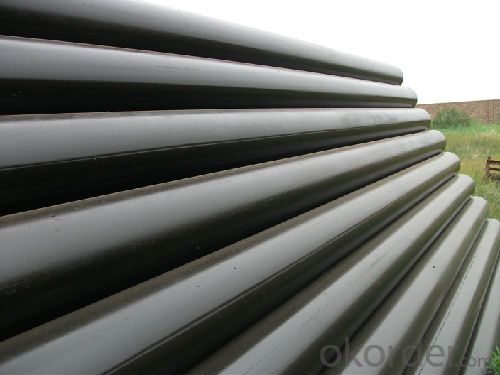
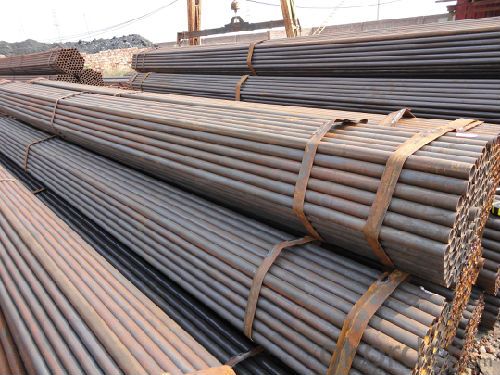
- Q: What is the difference between steel pipes and PVC-M pipes?
- Steel pipes are made from a strong and durable material, steel, and are commonly used for carrying high-pressure fluids or in industrial applications. On the other hand, PVC-M pipes are made of a plastic material called polyvinyl chloride modified, which offers good flexibility and resistance to corrosion. PVC-M pipes are typically used in low-pressure applications such as domestic plumbing, irrigation, or drainage systems.
- Q: Why can't stainless steel be put together with carbon steel tube?
- 1, the potential difference is: potential "stainless steel tube" and the negative potential "carbon steel" coupled "stainless steel", "a cathode carbon steel tube" is anode potentials of the two difference the greater the galvanic corrosion is bigger.2. An electronic passage formed by wire connection or direct contact. The carbon in the carbon steel tube loses its electrons to the stainless steel tube and the surface is absorbed by the etchant.3. Electrolyte: the contact area of two metals is covered or submerged by electrolyte. The iron in the carbon tube loses electrons to form ions into the solution, and the electrons on the surface of the stainless steel tubes are taken away by the corrosive agents in the electrolyte (such as oxygen in the air). Electrolytes become ionic channels.
- Q: How are steel pipes used in the manufacturing of automotive exhaust systems?
- Steel pipes are commonly used in the manufacturing of automotive exhaust systems as they possess high strength, durability, and resistance to heat and corrosion. These pipes are used to transport exhaust gases from the engine to the tailpipe, ensuring the safe and efficient operation of the vehicle. They are typically bent and welded together to create a complex network of pipes that helps direct the flow of exhaust gases and reduce noise levels. Overall, steel pipes play a crucial role in the construction of automotive exhaust systems, contributing to their reliability and longevity.
- Q: What is the average lifespan of steel pipes?
- The average lifespan of steel pipes varies depending on various factors such as their quality, usage, and maintenance. However, under normal conditions, well-maintained steel pipes can last for several decades or even longer.
- Q: Can steel pipes be used for structural supports in buildings?
- Yes, steel pipes can be used for structural supports in buildings. Steel pipes are known for their strength, durability, and ability to withstand heavy loads. They have high tensile strength, which means they can withstand large amounts of tension and compression without breaking or deforming. This makes them ideal for structural applications in buildings where strong and stable supports are required. Steel pipes can be used for various purposes such as columns, beams, trusses, and even as the main support for the entire building. They are also versatile and can be easily fabricated and customized to fit specific design requirements. Additionally, steel pipes are resistant to fire, corrosion, and pests, making them a reliable choice for long-term structural support in buildings.
- Q: Are steel pipes suitable for desalination plants?
- Yes, steel pipes are suitable for desalination plants. Steel is a durable and corrosion-resistant material that can withstand the harsh conditions and high-pressure requirements of desalination processes. Additionally, steel pipes provide excellent flow characteristics and can be easily welded, making them a reliable choice for transporting and distributing saltwater in desalination plants.
- Q: How are steel pipes used in the manufacturing of machinery?
- Steel pipes are used in the manufacturing of machinery primarily for conveying fluid or gas, providing structural support, and acting as a conduit for electrical wiring. They are commonly used as the framework for various machine components, such as conveyor systems, hydraulic equipment, and pneumatic systems. Steel pipes offer durability, strength, and versatility, making them an essential material in machinery manufacturing.
- Q: Water, gas, steel pipes, thick steel wire means?
- Thick steel wire pipe is the same wire pipe, but the wire pipe is thin tube, easy to damage, so with thick as the outer diameter can protect the wire tube, so called thick steel wire pipe.
- Q: What are the different types of supports used for steel pipes?
- The different types of supports used for steel pipes include pipe clamps, pipe hangers, pipe saddles, and pipe rollers. These supports are designed to securely hold and suspend the steel pipes in place, ensuring proper alignment and preventing sagging or movement.
- Q: How do you prevent leaks in steel pipes?
- One effective way to prevent leaks in steel pipes is to apply a high-quality coating or lining to the pipes. This protective layer acts as a barrier, preventing corrosion and minimizing the chances of leaks. Regular inspection and maintenance are also crucial to identify any potential issues early on and address them promptly. Additionally, ensuring proper installation techniques, using durable and reliable fittings, and following industry standards can help minimize the risk of leaks in steel pipes.
Send your message to us
Welded Black ERW Steel Pipe API 5L ASTM A53 Steel Pipe for Water Oil Conveying
- Loading Port:
- China Main Port
- Payment Terms:
- TT or LC
- Min Order Qty:
- 25 m.t.
- Supply Capability:
- 5500 m.t./month
OKorder Service Pledge
OKorder Financial Service
Similar products
Hot products
Hot Searches
Related keywords
